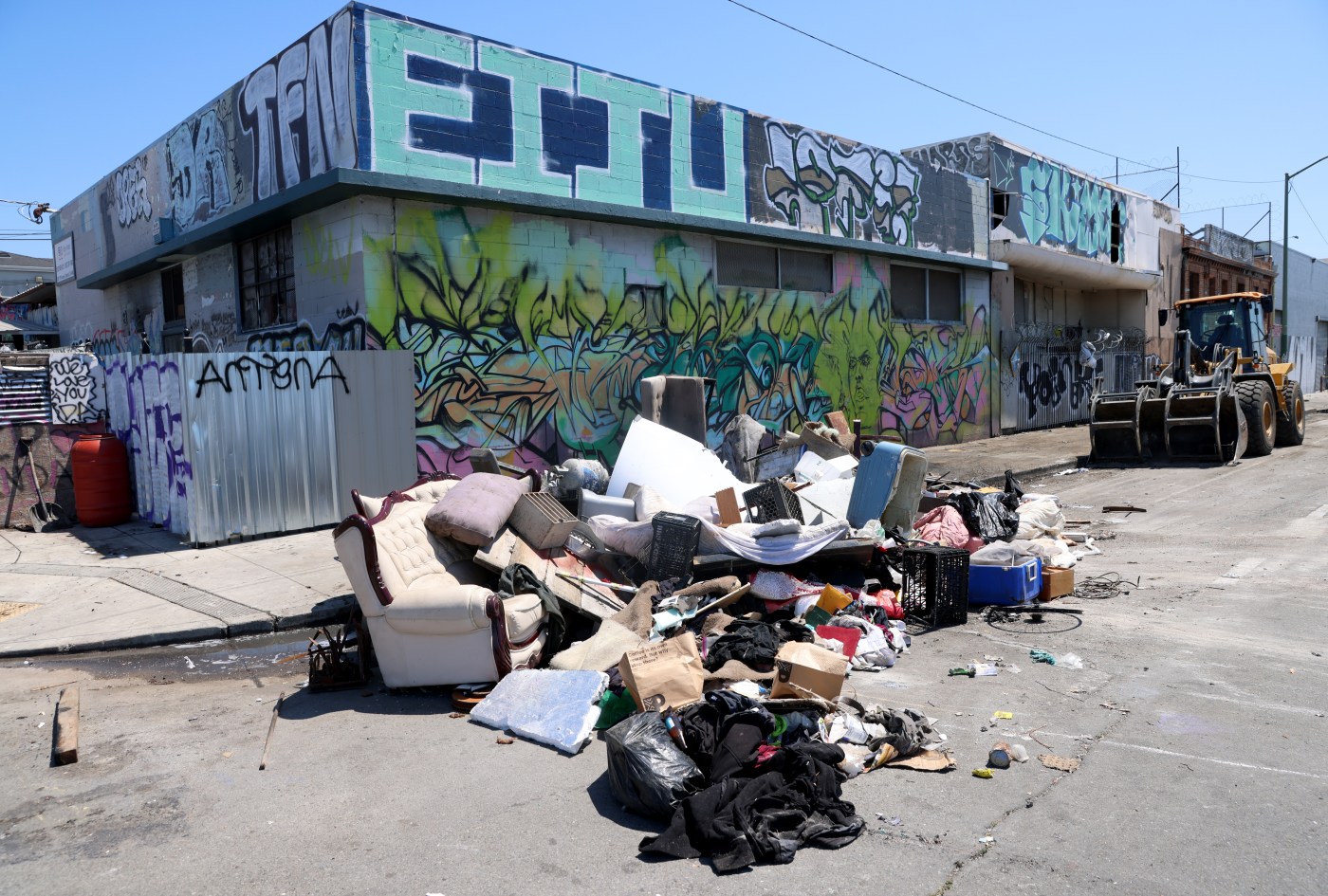Oakland’s homeless population rose 9% over the past two years, even as the total number of unhoused people in Alameda County dipped 3%, according to the latest official estimate released Wednesday.
Despite the increase in Oakland, the new figures represent a modest turnaround in the region’s fight against homelessness following the double-digit spikes in previous counts going back almost a decade.
Local officials said investments in affordable housing and homeless shelters have helped bring more people off the street and into lasting homes. At the same time, they acknowledged the enormity of the crisis they still face.
The latest tally identified 9,450 homeless people countywide, with 5,490 of them — more than half — living in Oakland. Just over 67% lived outdoors, in vehicles or in other places not meant for habitation. The rest stayed in shelters.
“There’s much more to be done, but we’re confident this represents realistic but positive progress,” said Jonathan Russell, the county’s top homelessness official, highlighting an 11% drop in the county’s “unsheltered” population as a key accomplishment.
The new numbers stem from the county’s latest biennial “Point-in-Time” homelessness census taken in January. More than a thousand volunteers equipped with flashlights and clipboards set out to identify everyone on the streets and in shelters.
Across the Bay Area, Contra Costa, San Mateo and San Francisco counties also conducted counts in January, and results are expected later this year. Santa Clara County, which took its tally last year, will not count again until 2025.
While widely seen as an undercount, the estimates are crucial to helping cities and counties plan their homelessness response and determining how much state and federal funding they receive. The previous round of tallies for the five-county Bay Area showed around 31,000 people with no permanent place to live on any given night, a 7% increase since 2019.
Despite unprecedented billions of public dollars spent in recent years to alleviate homelessness, it remains a grave challenge getting people off the streets as quickly as rising housing costs, job losses, and mental health and addiction issues force others out.
Nowhere is this more apparent than in Oakland, which saw its homeless population increase an average of 32% between each count from 2015 to 2022. In light of those increases, Mayor Sheng Thao touted the 9% jump as evidence that investments in affordable housing and shelter are making a difference.
Her office said that since 2020, the city has added 427 supportive housing units across eight sites funded by the state’s Homekey homeless housing and shelter program. The city also has 15 housing projects in development that will add 1,158 affordable units, half of which will be for people experiencing homelessness.
“As someone who was homeless as a young mother and lived much of my life trying to survive without secure and stable housing, I know how much having a dignified place to stay can help end the cycle of homelessness,” Thao said in a statement.
In East Oakland, not far from a massive homeless encampment on East 12th Street where he lived for seven years, Le Hung recently moved into a new apartment thanks to a local nonprofit that helped him secure a housing voucher.
Hung, 69, pays only $50 a month in rent, but he’s still living on the edge of homelessness. Since a car he was hoping to sell was towed from the encampment, he’s unsure how he’ll be able to cover his next payment.
“I ran out of money,” he said. “I don’t have even a dollar now.”
Related Articles
Gov. Newsom announces first $3.3 billion from Prop. 1 mental health bond
New law proposed to remove homeless encampments from creeks across Santa Clara County
Walters: Politicians keep shifting blame as California’s homelessness crisis worsens
California needs constitutional change to get serious about homelessness
Oakland City Council agrees to relocate homeless shelter, extend local homeless emergency
Elsewhere in Alameda County, Berkeley and Fremont, which have the second- and third-largest local homeless populations, saw decreases of 20% and 21%, respectively.
But Russell, the county homelessness official, said looming spending cuts as state and local officials stare down massive budget deficits could threaten that progress.
“It will be the ability to sustain and continue and increase investment that will allow us to keep that dial moving in the right direction,” he said.












